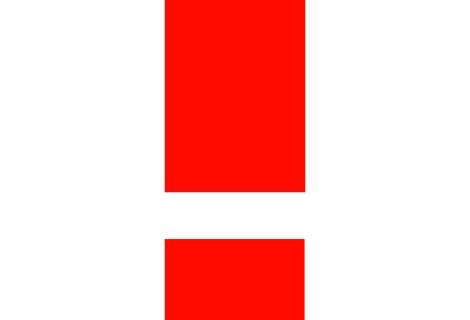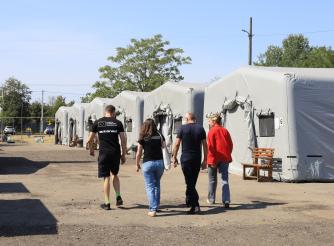New crossing points and ‘floating dock’ are cosmetic changes, as humanitarian access disintegrates in Gaza, warn aid agencies

As Israeli attacks intensify on Rafah, the unpredictable trickle of aid into Gaza has created a mirage of improved access while the humanitarian response is in reality on the verge of collapse, warn 20 aid agencies. The latest Israeli attacks on a displacement camp near UN aid facilities in Rafah reportedly killed dozens of people, including children, and injured many more. The ability of aid groups and medical teams to respond has now all but crumbled, with temporary fixes such as a ‘floating dock’ and new crossing points having little impact.
Aid agencies now fear an acceleration in deaths from starvation, disease and denied medical assistance, while land and sea entry points remain effectively shut to meaningful humanitarian assistance, most desperately fuel, and attacks in areas sheltering civilians intensify.
The systematic obstruction at Israeli-controlled crossing points, intensified hostilities, and prolonged telecommunications blackouts have reduced the volume of aid entering Gaza, including food, fuel, and medical supplies, to some of the lowest levels witnessed in the last seven months, said 20 aid agencies.
Médecins Sans Frontières/Doctors Without Borders (MSF) - one of the largest humanitarian and medical providers in Gaza - has been unable to get any supplies into the enclave since May 6. The lack of clean water supplies puts patients at high risk of disease. Yet, desalination kits and submersible pumps to set up sustainable water systems to provide water, are almost always denied by the Israeli authorities.
Challenges to distribute aid safely within the enclave have also reached a new high. In less than three weeks, nearly one million Palestinians have been newly displaced into overcrowded areas which lack the means to support human life. Continued concerns for the protection of aid operations, including the safety of aid workers, and the proliferation of Israeli checkpoints within Gaza also continue to hamper the humanitarian response.
Zenab, a pregnant woman whose husband was killed in an Israeli air strike, told CARE International in March she fled from Gaza City to Rafah and then to Khan Younis. She had to walk hours on end to different pharmacies, hospitals, and health centers to find medication to deal with pregnancy complications, and could not find enough drinking water or food. Her doctor has said she needs a C-section and is due to give birth next week, but fears there may be no space in any of the remaining partially functioning hospitals.
Gaza’s health system has been effectively dismantled. Virtually every hospital in Gaza has either been issued ‘evacuation orders’, is under an Israeli siege or will soon run out of fuel and supplies. Rafah’s largest hospital, Abu Yousef al-Najjar, has been forced to shut down following an Israeli-issued ‘evacuation order’ and no hospital in northern Gaza is currently accessible. Medical workers across Gaza say patients are dying daily due to a shortage in medical supplies, as doctors, nurses, and other health workers continue to be killed or forcibly displaced.
Save the Children said children were no longer able to be medically evacuated from Gaza and are struggling to cope with the horrors they are facing daily and the loss of family and loved ones and are in desperate need of psychosocial support.
Oxfam partner organization Juzoor said on 19 May that six of the already overcrowded shelters they supported in Jabaliya in northern Gaza were completely destroyed by Israeli bombardment. The shelters had medical services and were hosting displaced people from surrounding areas in the north. Staff members who fled the area returned to find patient beds burnt and critical medical equipment and supplies destroyed.
In southern Gaza, the flow aid has been completely cut off. All bakeries in Rafah have been forced to shut. Dwindling supplies, the inability to access warehouses storing aid, and insecurity, has forced aid agencies to suspend distributions in the south, and may soon be forced to suspend in Khan Younis, Deir al-Balah, and Gaza City as supplies are rapidly depleting. Many Palestinians are now surviving on less than 3% of their daily water needs as temperatures rise dangerously high and diseases like diarrhea and hepatitis rapidly spread.
Announcements of additional crossing points and initiatives, including the new ‘floating dock’, have given an illusion of improvement, but have largely amounted to cosmetic changes. Between May 7 and 27, just over 1,000 truckloads of aid entered Gaza through all crossing points combined, including the newly built ‘floating dock,’ according to UN counts. This is alarmingly low given the skyrocketing humanitarian needs of Gaza’s 2.2 million people, and much lower when compared to most other periods in the last seven months.
The Rafah crossing, one of the main entry points for humanitarian workers and aid into Gaza, has been shut since May 7, when Israeli forces seized the crossing point. Meanwhile, more than 2,000 aid trucks remain waiting in Arish in Egypt for Israel to allow them entry, with food rotting and medicines expiring as families face heightened levels of starvation a few miles away. While Kerem Shalom remains officially open, commercial trucks rather have been prioritized, and the movement of aid remains unpredictable, inconsistent, and critically low.
Aid agencies and human rights organizations continue to call for an immediate, sustained ceasefire to save and protect, and for consistent and predictable routes to bring aid into and across Gaza. All parties must protect humanitarian access and delivery of aid. Organizations call on the warring parties to adhere to international humanitarian law (IHL), and for Israel to uphold the International Court of Justice (ICJ) rulings, including its most recent order for Israel to halt its military offensive on Rafah. The international community, including third party governments and UN Security Council members, remain bound by their obligations under IHL, and the ICJ rulings, to ensure Palestinians are protected.
Aid agencies are working around the clock, trying to deliver lifesaving aid under the most impossible circumstances, but there is little more that can be done if States continue to shirk their legal obligations and moral responsibility to secure a ceasefire.
Editor’s Note
- Aid agencies have repeatedly cautioned that any attempts to get aid into Gaza by air and sea – which remain inefficient, costly, and even dangerous - cannot replace land crossings and risk becoming a distraction from addressing the barriers aid agencies are facing on the ground. The pre crisis average per working day of trucks entering Gaza was 500, including fuel.
- Between May 7-23, 906 truckloads of aid entered the Gaza Strip via all land and sea crossing points combined, and another 160 truckloads of aid entered between May 24-26, totaling 1,066.
- More than 81,026 Palestinians in Gaza remain critically injured and all medical evacuations out of Gaza have come to a halt since Israel’s seized the Rafah crossing on 7 May. An estimated 14,000 critically ill and injured patients require lifesaving treatment abroad.
- A total of 4,500 trucks, including commercial as well as aid trucks, remain waiting at the Egyptian side of the Rafah border crossing.
- At the Kerem Shalom land crossing, Israeli authorities are now prioritizing commercial trucks over aid, meaning the food and other supplies entering will not reach those most desperately in need.
- Access through Erez West (Zikim) remaining severely restricted.
- More than 266 aid workers, the majority Palestinian have been killed.
- Since May 7, humanitarian organizations in the Logistics Cluster have been unable to access storage facilities, facilitate storage services or operate the cargo notification system to support humanitarian actors.
- As of May 7, more than 450,000 people were in the Al-Mawasi area, according to UNRWA, and this number has increased since attacks on Rafah intensified.
Agency signatories:
- Action For Humanity
- ActionAid International
- Alliance Secours Islamique France
- Amnesty International
- CARE International
- Danish Refugee Council
- Humanity & Inclusion/ Handicap International (HI)
- International Plan International
- Islamic Relief
- Médecins du Monde France
- Médecins du Monde Spain
- Médecins du Monde Switzerland
- Médecins Sans Frontières/Doctors Without Borders (MSF)
- Mercy Corps
- Norwegian People’s Aid
- Norwegian Refugee Council
- Oxfam
- Premiere Urgence Internationale
- Save the Children
- War Child

